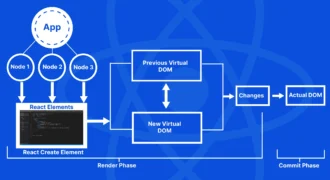The Rise of Low-Code Mobile App Development: What You Need to Know
- 1 Why is Low-Code Mobile App Development on the Rise?
- 2 Where can you use low-code app development?
- 3 Principles of low code app development?
- 4 Benefits of Low-Code Mobile App Development
- 4.1 Faster Development Time
- 4.2 Lower Development Costs
- 4.3 Easier Maintenance
- 4.4 Increased Flexibility
- 4.5 Improved Collaboration
- 5 Challenges of Low-Code Mobile App Development
- 6 Conclusion
Our everyday lives revolve around mobile apps. We rely on mobile apps for many things, from ordering food to booking a ride. As the demand for mobile apps grows, businesses, too, need faster and more efficient mobile app development methods. This is where we see the magic of low-code mobile app development.
Low-code mobile app development is building mobile apps using visual interfaces and drag-and-drop components instead of writing code from scratch. You can create apps quickly without requiring extensive coding knowledge.
In this article, we discuss the rise of low-code mobile app development and what you need to know about it.
Why is Low-Code Mobile App Development on the Rise?
Low-code mobile app development is gaining popularity due to various factors that make it a preferred choice for businesses and developers. Firstly, the increasing demand for mobile apps has made it essential for companies to have a mobile presence.
Traditional app development methods are time-consuming and require high technical expertise. It makes it difficult for businesses to keep up with the market demand.
Low-code app dev platforms solves this problem by allowing developers to create apps quickly and easily without writing code from scratch.
Moreover, there is no need for more skilled developers. Low-code mobile app development allows businesses to create apps even with a small team. This makes it easier for companies to develop apps in-house and reduces the cost of hiring external developers.
Low-code mobile app development tools are designed to be user-friendly, reducing the learning curve for developers and making it easier for them to create high-quality apps. These tools provide:
- Drag-and-drop interfaces.
- Pre-built templates.
- Pre-built components for building apps quickly and efficiently.
Where can you use low-code app development?
- Mobile applications
- User interface design
- Application Programming interface (API) development
- Cloud-native applications
- Agile transformation
Principles of low code app development?
Low-code development is based on a set of principles that aim to simplify the software process and empower developers with limited programming knowledge.
Low-code platforms enable users to create applications by visually modeling the desired functionality, rather than writing extensive lines of code. Abstraction allows developers to work at a higher level of abstraction, focusing on the logic and functionality of the application rather than the technical implementation details.
Low-code app development promotes rapid iteration and agility by facilitating quick changes and updates to applications. The platforms offer features such as drag-and-drop interfaces, pre-built components, and reusable templates.
Benefits of Low-Code Mobile App Development
Faster Development Time
Low-code mobile app development allows developers to create apps quickly and easily using visual interfaces and drag-and-drop components. This reduces the time it takes to develop an app. So businesses get their products to market faster.
Lower Development Costs
Traditional app development methods require a high level of technical expertise, which can be expensive. Low-code mobile app development eliminates the need for extensive coding knowledge, reducing development costs.
Easier Maintenance
Low-code mobile app development makes maintaining and updating apps easier. You can make changes quickly and easily using visual interfaces and drag-and-drop components.
Increased Flexibility
Low-code mobile app development process allows developers to create flexible and easily customized apps to meet the needs of different businesses and users.
Improved Collaboration
Low-code mobile app development makes it easier for developers and business stakeholders to collaborate on app development projects. Visual interfaces and drag-and-drop components make communicating ideas easier and making changes in real time.
Challenges of Low-Code Mobile App Development
While low-code mobile app development has many benefits, it also has some challenges.
Limited Customization
Low-code mobile app development tools may not offer the same level of customization as traditional app development methods. This limits the functionality of the app and makes it challenging to meet the specific needs of particular businesses or users.
Security Concerns
Low-code mobile app development tools may not offer the same level of security as traditional app development methods. This can put sensitive data at risk and hackers can exploit vulnerabilities.
Learning Curve
While low-code mobile app dev platforms tools are designed to be easy to use, a learning curve is still involved. Developers may need to learn how to use the tools effectively before creating high-quality apps.
Conclusion
Low-code mobile app development is on the rise, and for a good reason. It offers a faster, more efficient way to develop mobile apps, making it an attractive option for businesses and developers alike.
While there are some challenges to using low-code mobile app development tools, the benefits outweigh the risks. As the demand for mobile apps grows, low-code mobile app development will become an increasingly important part of the app development process.



















